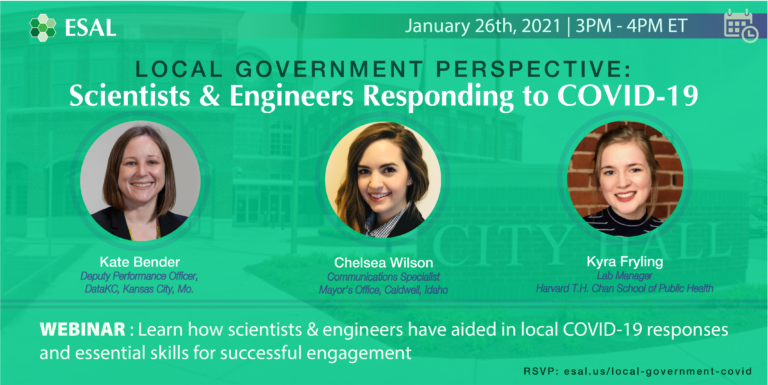
On February 19, ESAL collaborated with the Federation of American Scientists (FAS) and the National Science Policy Network (NSPN) to host the first of two webinars on “COVID Conversations.” The event featured three specialists: Chidi Akusobi (MD/PhD candidate, Harvard Medical School), Mikhaila Calice (research assistant, UW-Madison Dept. of Life Sciences Communications) and Geoff Hunt (public outreach specialist, American Society for Microbiology. Moderated by ESAL's Rachel Burckhardt, the panelists discussed how scientists and engineers can talk about COVID-19 with their communities to dispel misconceptions and offer needed information about the pandemic.
All three panelists identified effective communication as critical to building trust. Akusobi cited its importance in people understanding public health interventions and taking measures such as social distancing and masking. Hunt emphasized that trust gets established through credibility as a scientist, even if you are communicating about something outside of your discipline. Calice lamented the polarization of the American public around trusting science and advocated for the nonpartisan introduction of science into dialogues.
A discussion ensued about the challenges of maintaining public trust, with Hunt stressing the value of being willing to admit if you don’t know something, while pointing people to reliable sources such as higher education institutions. Calice noted that maintaining trust also requires understanding the perspectives of your audiences, such as vaccine hesitancy, and adjusting your communications accordingly. Akusobi pointed out that cultivating trust, especially in marginalized groups, is best achieved in community spaces where people already feel comfortable – whether churches, schools, or barbershops.
Calice brought up the need to develop consistent messages, noting the confusion created by leaders sharing disparate explanations and theories about the COVID-19 pandemic. Hunt noted the challenge of developing messages that convey the complexity and the nature of ongoing, evidence-based scientific research. Akusobi pointed out that being upfront about the uncertainties inherent to science – such as whether people will be carriers after receiving the COVID-19 vaccine – should be coupled with sharing what is well-known and how additional knowledge will be gained through research.
Finally, the panelists shared their thoughts about scientists getting engaged in public communication. Hunt thought that becoming a member of a scientific society is a great place to start connecting with networks of people already engaged with the public. Akusobi added that you can start small, such as in conversations with your family and friends where you can practice answering questions the public might ask, after which scaling up might come naturally. Calice urged scientists to hone their communication skills as they reach beyond their disciplines to collaborate with people in other fields.
The takeaway suggestions from this webinar included:
A recording of the webinar is available here .